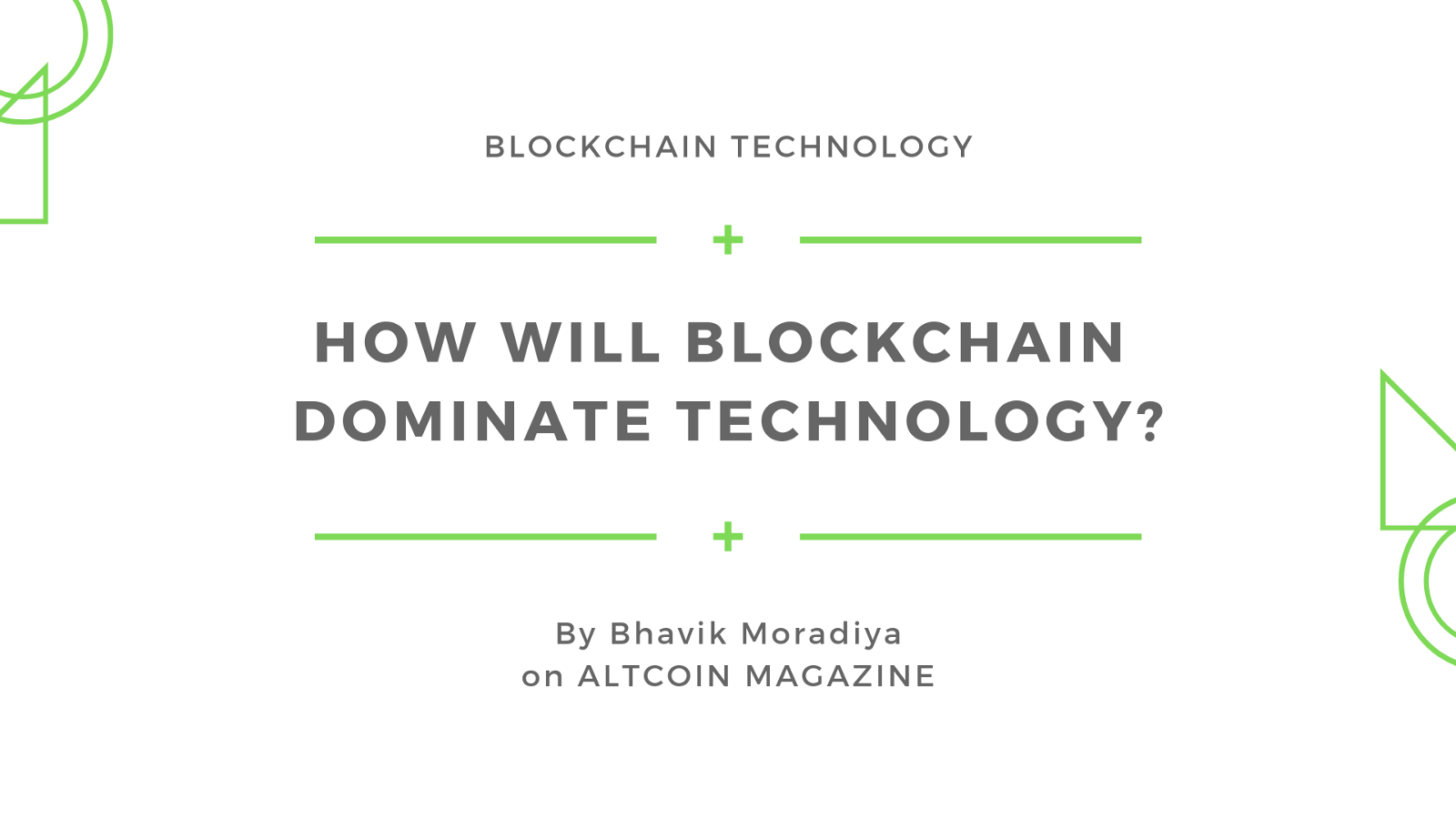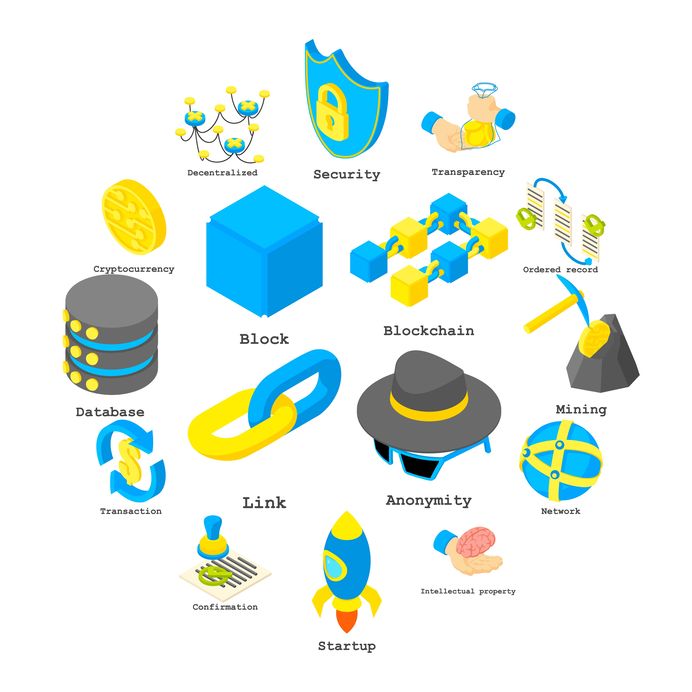How Will Blockchain Dominate Technology?
By Bhavik Moradiya on ALTCOIN MAGAZINE
Blockchains, or digitized and decentralized lists of records, generally of financial transactions or other, similar data, have been growing in popularity in recent years. The trend has taken off to the extent that it has attracted the attention of many tech-organizations, most of which are investing time and funds into carrying out more research on blockchains. However, for most of us, the concept of blockchains seems a relatively uninteresting idea that talks about the future of the internet and online technology and how all of it could be changed… the realities seem so distant and hypothetical at this stage that they do not even seem to be worth talking about. The reality, however, is actually a lot different.
The interaction of average customers with blockchain technology
Blockchain technology may be something that not everyone knows about, but the unwary customer, sitting in front of their gadget of choice and using internet technology is going to be the ones that will most directly be affected.
One of the most important aspects to consider about blockchains at this point is how a new style of blockchain technology is now available. ‘Updating’ blockchain technology in this way will mean that users will be able to avail better protection of their data, enjoy greater privacy and audit, and will gain greater compliance with both geographic as well as industry-related regulations. Further, the open source standards being applied now means that it is easier and less risky for any organization to adopt blockchain technology. At present, efforts are underway to engage industry regulators as well as local governments and help bring about widespread adoption of blockchain technology. The mantra being used to promote adoption of the updated version of blockchain technology is that blockchain technology has evolved to ensure that all the concerned parties can have control of the relevant data and the monopoly that had so far been practiced in this field is now well on its way to being broken.
Imagine this particular scenario to yourself: you go online because you have to search any particular terminology that you are not very familiar with, so you search the term on the search engine of your choice, the definition pops up and you are good to go. Then, you decide to check your online, social media accounts, spend some time online, interacting with all the knowledge that is so easily available to you, before you finally close your device and return to concentrating on your immediate, physical surroundings.
In all the time that you spent online, was there any, single, particular trend that you noticed? All the knowledge that you gained online, no matter which search engine or social media account you decided to use, was being controlled. Moreover, all the control was in the hands of a single entity. The number of on-going and recent issues with the big, internet corporations such as Google, Facebook, and Twitter showcase how essential it is to have a more decentralized distribution of power to control the online forum as well as the knowledge that is available therein. That is not to say that these corporate giants have not done their utmost best to facilitate the online distribution of knowledge or helped millions of people interact with Internet and technology in multitudinous ways; this is just the next, obvious step forward.
Who is working on the blockchain right now?
At present, just as is the case for many customers, and potential users, blockchain technology is not a very well defined concept that is being explored with a certain aim in mind. Sure, there are many organizations that are working on blockchain at the moment. These include, other than banks, technology giants such as Apple, Microsoft, Wal-Mart and Alphabet to name just a very few. In reality, though, most of the work that is being done on blockchains is also being kept under wraps.
Even so, actively exploring all the potential that the future of blockchain technology could promise us is one thing that most companies are aiming to discover. One example of the work being done in this regard is of Apple’s filing a patent for use of DLT to specifically timestamp certain data. While this it may sound rather vague initially, Apple’s filing for patent rights shows that the company believes that this could have major implications that would benefit them in the future. Most of the other companies involved in blockchain and distributed technology research work also indicate how bright a future this field is presenting at the moment. The aim here is simple; make sure that the right to share data and what content may be viewed by which particular users, is not something that is decided by a single company alone. Data, as well as the right to access it, should be decentralized so that we may move forward into a more open, more accessible world.
What are the implications at stake?
The implications that we could see are not so much user-centric as they are aspects that the affected organizations in question might end up having to suffer from. For instance, with large, data controlling entities such as Google, it is definitely counter-productive seeing them invest time, money and research into a concept such as blockchains and decentralization of data since such research has the potential to render these very organizations irrelevant in the future. That is not to say that all companies will suffer this fate. But quite a few organizations, operating in the world today could become irrelevant.
So in light of this knowledge, what should the future hold? Should organizations stop research on blockchain technology? Should they give up on the idea of decentralized control over knowledge and data? Not really. In fact, in spite of what is at stake here, it is still heartening to see how many companies, even outside of the financial sector are still looking for ways in which lesser reliance will have to be placed on central authorities and data management would become a more decentralized concept. The data reaping hierarchy being maintained by social media giants such as Google, Twitter or Facebook, might also not be an entirely disadvantageous solution as it would make room to herald change and bring new players to the technology landscape.
Blockchain research at the enterprise level
With enterprise level usage of blockchain technology, corporations may look forward to really dominating actual projects in the real world. Thousands of blockchain pilots have been implemented, even now, in large-scale corporations, with IBM emerging as one of the leading implementers of the technology.
In spite of all the risks involved, blockchain technology gives major corporations a number of benefits that can simply not be ignored. Just some of these benefits include:
· The ability to cut back on costs as well as reduce the time required to complete transactions.
· The opportunity to improve security for both the products involved as well the system involved.
· Locate as well as reduce the occurrence of fraudulent acts as well as instances of counterfeiting, especially for organizations operating in the business sector.
· Increase the amount of transparency available in the enterprise structure at present.
· Increase incentives with regards to certain, desirable behavior.
· Increase the loyalty among their customers.
In itself, blockchain is one of the quietest revolutions that the technology world has ever seen. Every day, thousands of businesses are evaluating and deploying their own blockchain solutions, or initiating research into the technology. The platforms, specifications, projects, and opportunity for growth and creation of value are clear and may now be easily achieved also.





